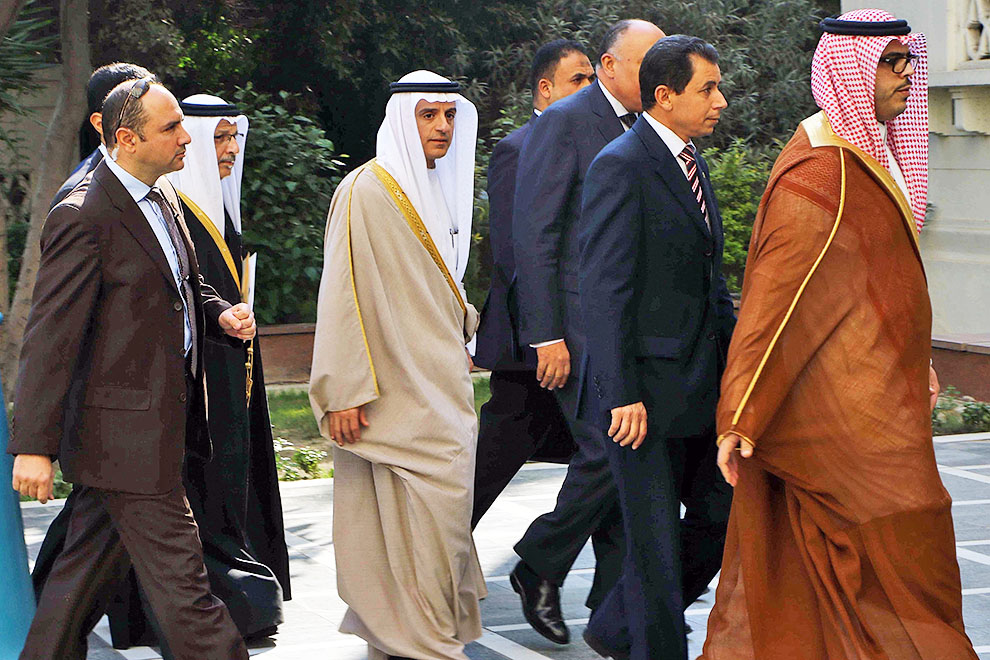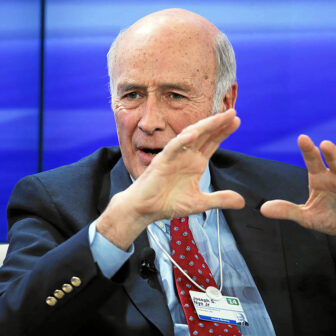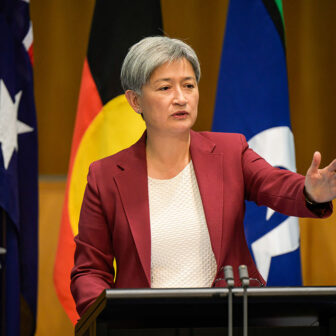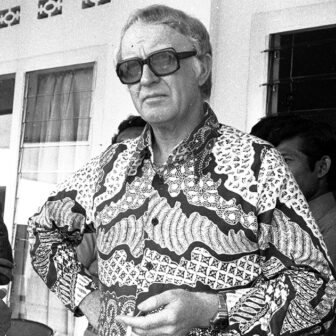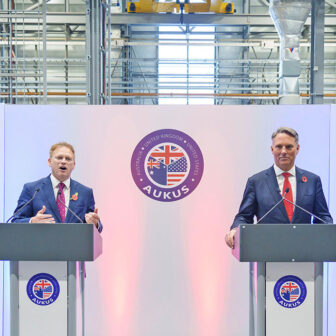Almost forty years ago my wife was in Souk Hamidiyeh in Damascus, standing beside a stall selling women’s underwear. Syrian women dressed in conservative black were inspecting garments featuring lace, feathers, devices that played “Jingle Bells,” and canaries in most improbable places. How was this contrast possible? she asked the stall owner. “Ah,” he replied. “When foreigners look, they only see the mountain. Syrians see the volcano underneath.”
Perhaps regimes across the Arab world have failed to see their own volcanoes, too. They manifestly failed to grasp how their interests would be affected by growing educational opportunities, evident in a rise in literacy from 18 per cent to 82 per cent since 1960. There was a thirty-fold increase in the number of Arabs online between 2000 and 2012, but regimes paid little attention to the impact of the internet and social media on alienated Muslims in Arab and Western societies. They welcomed foreign direct investment without appreciating that it also brought the values and disciplines of global business models and raised expectations of individual empowerment and gender relations.
Most importantly, perhaps, they failed to recognise the significance of each of those factors in shaping inchoate desires within their societies to be modern, and Arab, and in many cases Muslim, in the twenty-first century.
Western policy-makers shared in that analytical failure. We were too close to, and too comfortable with, Arab regimes. We wanted to believe their assurances about how they were reshaping their countries. Like all good diplomats and salespeople, they made us feel good about ourselves, and so we were inclined to discount our concerns about the real-time performance of ageing, sclerotic, parasitic leaderships. We anticipated that their time at the helm would pass, to be followed, surely, by a new generation more attuned to our vision of a globalising world.
In short, we didn’t pay enough attention to the gaps between rhetoric and political and social reality. We underestimated the resilience of elites determined to protect their privileges and identities from encroachment by others. We conflated popular enthusiasm for elections with a coming triumph of democratic values.
With a handful of exceptions, we didn’t see the uprisings of 2011 coming. We didn’t think we had to look. We had missed the enthusiasm for change on public display. And we failed to see that reform, when it came, could modify the functioning of systems but not the values underpinning them.
So when Mohamed ElBaradei arrived at Cairo airport in early 2010, having completed his term as director-general of the International Atomic Energy Agency, to a tumultuous reception by Egyptians who saw him as a fresh political force, and then left again barely forty-eight hours later, we missed the point. We focused merely on what we saw as his political ineptitude, or on the capacity of the Mubarak regime to stare him down.
We also missed, and most Arab intellectuals dismissed, the significance of the rejoining of student and labour activism in Egypt from 2009 onwards, mostly because that initiative at first went nowhere. We did not appreciate how it could rebound, leveraged by the internet and social media, into a key factor in the unfolding events of 2011.
We should have been focused, in other words, on the underlying factors making the turmoil of the Arab Uprisings a real possibility.
In 2002, under the sponsorship of the United Nations, Arab intellectuals had begun publishing a series of detailed analyses, known as the Arab Human Development Reports, identifying key regional social, economic and political deficits. Together with publications by Arab experts in other think tanks in the Western world, they warned that the Arab world was “richer than it was developed.” We were placed on notice that reform was urgently required in areas ranging from gender empowerment to education if the gaps between the Arab world and other countries were to be closed.
Clearly written, evidence-based, intellectually cogent and devoid of self-pity and excuses, the analyses identified the causes of Arab ill-performance as arising for the most part from institutions Arab governments had created but failed to reform. The political implications of the analyses were not clearly stated, but they were obvious enough.
Within the Arab world, the analysts were mostly ignored, condemned or dismissed for their lack of political correctness. They had failed, in effect, to pin responsibility, or even causality, elsewhere, and that was unacceptable.
As the fifteenth anniversary of the first of those reports approaches, it’s clear that none of the key concerns articulated by those Arab intellectuals have been addressed. Nor have the changes in the region during that decade and a half made achieving the reforms they called for any easier.
Instead, the collapse of the Arab Uprisings has seen a reaffirmation of authoritarian values and practices. This has been reinforced by the abject failure of supposedly liberal Arab voices to rise above their political differences and defend a robust separation of powers. No one (except perhaps in Tunisia, and even that is questionable) is insisting on respect for the values of inclusive politics and empowerment. Nor is there evidence that Arab governments have harnessed, mobilised and empowered creative talent in business, politics or the arts.
Meanwhile, across the Middle East, the demographic time bomb ticks on. Amid ongoing weakness in oil prices, budget deficits are worsening. Graduate unemployment is at a record high. Timorous responses to consumer demand for cheap energy and water, and the impact of global warming on ill-equipped infrastructure have created increasingly obvious environmental problems. Government have shied away from unpalatable choices in response to financial pressures, for fear of the political and security consequences.
By failing to capture the political imagination of the young middle class, governments in the region have struggled to find a sustainable balance between satisfying the expectations and demands of their political audiences and meeting the imperatives of national survival in a globalised security environment.
In seeking to find that balance, some countries will cope better than others. In Syria, Libya and Yemen, the structures of government have effectively collapsed. Iraq is unlikely to see a full restoration of central authority. Egypt, long the Arab centre of gravity, is regressing politically: its human rights record is appalling but few Egyptians appear to care; its economic and environmental problems are manifest; and it maintains – with the blessings of its major Gulf financiers – a steadfast refusal to accept inclusive politics as part of an effective response to persistent domestic security woes.
The small Gulf oil exporters are in a different situation. Although the sustained downturn in oil prices is hitting the property market and consumer spending, sovereign wealth funds are amply resourced. If necessary, the United Arab Emirates and Qatar can introduce a value-added tax, impose excise duties on vehicles, and tax expatriates in order to manage financial pressures. Risks exist within the patriarchal, intimate political systems that have applied since the 1970s, but in general they appear relatively stable.
The challenges for Saudi Arabia are greater. The Saudi population is larger, the relationship between the House of Saud and its conservative religious allies is complex, and the leadership is undergoing generational change. Concerns about an ascendant Iran are linked to anxieties about the Shia minority in the kingdom and the challenge to the political authority of the Sunni leadership in Bahrain.
There are fewer high-income expatriates in Saudi Arabia who can be taxed to help reduce growing financial deficits. Capital expenditure can certainly be cut back. Introduction of a value-added tax is being considered. But unless the country’s leaders persuade Saudi citizens to move from a culture of entitlement to one that can cope with diminishing oil revenues, and unless they introduce tax-based revenue streams from Saudi nationals to supplement their income from oil, they face the prospect of a major financial crisis within a decade.
As with the smaller Arab oil producers, these are manageable problems for Riyadh. But they also steer Saudi priorities towards securing a predictable regional order in which to deal with the complex challenges they present.
Always inclined to be risk-averse, the Saudis are set on shaping that regional order to counter not only the perceived challenge of Iran but also, where possible, the demands and values that flowered briefly across the region among the popular and Islamist activists of 2011.
The counter-revolutionary impulse – a gadarene rush back to the familiar comforts of authoritarian rule at the expense of creativity, empowerment, human rights, accountability and transparency in government – can only succeed, even in the short term, with a strong, balanced economic performance. To be sustainable, it also requires a demonstrated sensitivity to popular expectations of dignity in circumstances where interaction with the state is unavoidable.
Political leadership, not terrorism, is the key to meeting that demand, and critically important to the Arab future. But such leadership is in short supply. Nor is there necessarily a political solution to be found to many of the most pressing challenges of the coming decade.
Significant gaps remain between urban and rural Arab populations, and between elites and others, not only in terms of literacy and numeracy but also in terms of their daily experience of dealing with instruments and agents of state authority, from police to bureaucrats and teachers.
Webs of privilege, patronage networks and corruption, and fear of open-ended change in social and political spheres limit the scope for systemic reform. The avowed secularism of “modernising” Arab regimes was always a phenomenon of the urban elite, closely linked to issues of class and visceral rejection of the Islamist “other.” But whereas political Islam is now in retreat, the sophistication, connectivity and lethality of jihadist forces has increased dramatically.
The vast majority of Arab populations are unlikely to experience a closing of the gaps between their economic and social circumstances and those that prevail in the rest of the developed world. State authority – a critical factor if programmatic reform is to be delivered rather than merely announced – is increasingly at risk. Ordinary people feel little connection to national events and policies. Localised struggles for turf, or in some cases for survival, are privileging militias, traditional power-brokers and other regressive forms of rule.
Competing narratives of victimhood, and the newly fashionable rubric of grassroots empowerment are both open to exploitation by forces that are in practice deeply disempowering and increasingly sectarian in their behaviour and beliefs. They may prove to be the death knell of the progressive and creative elements within Arab society.
These circumstances bode ill, not only for Arabs but for all of us. There is little that Western countries can do directly to help in the rebooting of Arab values. But we do need to avoid policy approaches and rhetoric that can make matters worse.
The states and societies of the Middle East have had more than their share of unequal and conflictual dealingswith outside parties. Western policy-makers have eroded our own credibility by accommodating the corruption and human rights abuses of regimes – sometimes out of expediency, and sometimes for want of an alternative under the pressure of events – and failing to apply the same moral standards to Israel as we apply to other parties in the Middle East. Our failures have damaged the standing of those in the region who respect our values and sometimes pay heed to our advice.
A rarely acknowledged consequence (in the West, at least) of those failures, and one that is coming to haunt the region, is the fostering of Arab identities (both national and sectarian) framed by collective memories and mythologies of grievance where the West is concerned.
Like most other nations, Arab societies are shaped by their own versions of history and of popular aversion, in many cases to near neighbours. The region has too much history, and not enough geography, to expect anything else. Memories and mythologies in which external players – primarily the United States – are cast in such negative terms have been important in shaping the overall strategic outlook for parts of the Arab world. They influence Arab responses to efforts to restore balanced relations between Iran and the West; they are seized on by non-state actors to validate their antipathy to an established regional order in which the United States has long played a key part.
Australia’s increasingly close relations with the Arab states of the Persian Gulf, as well as the alliance relationship with the United States, mean that such perceptions matter to us. Our wider interests, including the protection of Australians at home and abroad, are also at risk when Arab governments are challenged from within by those they have been alienated or marginalised from national politics.
We need to be directing our attention to the likelihood, and the possible consequences, of these institutional and policy failures continuing. Indeed, we need to ask whether the political cultures in the region that remain bound by collective memories of victimhood, or dogma claiming divine sanction, will ever be able to understand, let alone compete in, a global market of ideas dominated by political cultures and institutions that draw primarily on mythologies of promise, achievement and adventure, intellectual and otherwise.
Heroism and heroes – whether they are politicians, artists, business leaders, scientists or educators – shape visions of the possible. And among its many deficits, the deficit of heroes in the contemporary Arab world is alarming. Different as they are in almost all other respects, Nobel Peace Prize laureate ElBaradei – surely the sort of positive role model that is required if the Arab world is to realise its creative potential – and Islamic State’s Abu Bakr al-Baghdadi have in common that they inspired hope for an alternative future.
In the case of Baghdadi and others like him, we focus at our peril on their failures and shortcomings rather than on the groundswells – the volcanoes – into which they tap. In her magisterial analysis of the factors contributing to the outbreak of world war in 1914, Margaret MacMillan argued that popular mobilisation in Europe arose not as a result of despair and economic adversity, which was growing among the working classes, so much as in response to the promise, and excitement, of visions that proved to be catastrophic. The same can be said of the Arab world today.
Radicalisation is fed by humiliation and despair, but 2011 reminds us that Arab mobilisation is also driven by hope. There will be a surfeit of adversity across the Middle East in the next decade, including ethnic cleansing, sectarian conflict and economic malaise. The human cost of conflict will have corrosive social and political consequences enduring for generations to come.
From a strategic perspective, however, we face the further possibility that, after decades of unfulfilled promises, hope will be offered, possibly to increasingly radicalised audiences, by those whose views and values are deeply antagonistic to our own. We may well succeed over time in degrading the potency of the vision offered by Islamic State and other jihadist groups, partly through military measures to reverse their momentum. We can, and should, highlight their cynicism, debunk their narratives, castigate their brutality and condemn those governments who travel with them.
We should be consistent in upholding and defending our own values while we do so. The rules of war must be respected on our side, even when those we fight, and some of those who fight for us, choose to ignore them.
But if we fail to support hope among the peoples of the region for a future consistent with the values we would like to see emerge there, we will not have secured our future, or helped them to secure theirs. •
